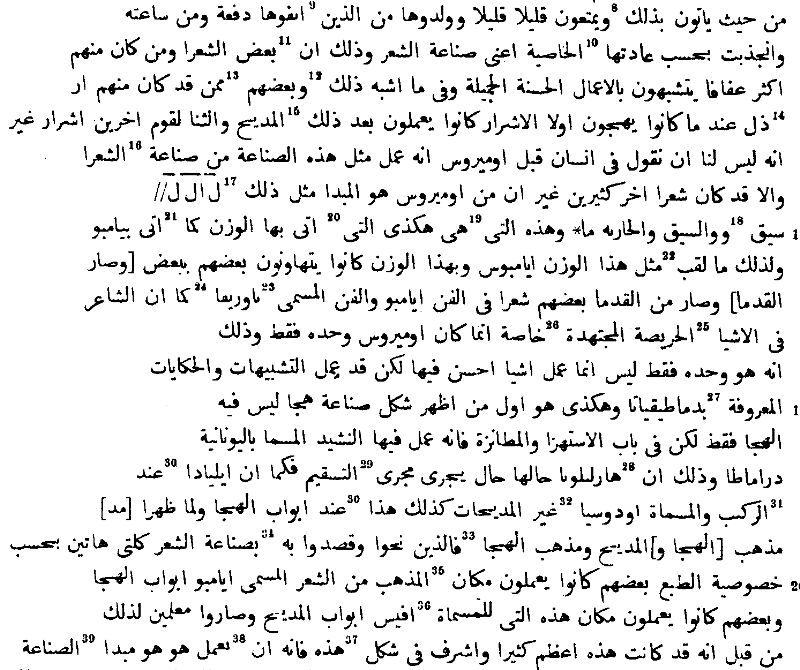Аристотель «Поэтика»: Развитие и разделение поэзии (1448b24)
Перевод М. Гаспарова
[b24] Распалась же поэзия <на два рода> сообразно личному характеру <поэтов>. А именно, <поэты> более важные подражали прекрасным делам подобных себе <людей>, а те, что попроще, — <делам> дурных <людей>; последние сочиняли сперва ругательные песни, как первые — гимны и хвалебные песни. [b28] До Гомера мы не можем назвать ничьего такого сочинения, хотя, вероятно, их было немало, а начиная с Гомера — можем: таков его «Маргит» и тому подобное. [b30] В этих стихах и явился по удобству своему ямбический метр — потому и по сей день он называется ямбическим <язвительным>, [b32] что с помощью его люди язвили (ίαμβίζειν) друг друга. И вот явились меж древних поэты героические и ямбические. [b34] При этом Гомер как в важных <стихах> был поэтом по преимуществу (ибо он один не только хорошо <писал>, но и создавал драматичные подражания), так и в комедии первый показал ее формы, драматично представив не ругательное, а смешное, — ибо его «Маргит» относится к комедиям так же, как «Илиада» и «Одиссея» к трагедиям. [49a2] Когда же явились трагедия и комедия, то кто к какому роду поэзии от природы чувствовал влечение, те вместо ямбических поэтов сделались комедийными, а вместо эпических — трагедийными, потому что эти формы были лучше и достойнее прежних.
Перевод В. Аппельрота
Перевод Н. Новосадского
А Гомер и в серьезной области был величайшим поэтом, потому что он единственный не только создал прекрасные поэмы, но и дал драматические образы, и в комедии он первый указал ее формы, представив в действии не позорное, а смешное. Его «Маргит» имеет такое же отношение к комедии, какое «Илиада» и «Одиссея» к трагедиям. А когда (у нас) явилась еще трагедия и комедия, то поэты, следуя влечению к тому или другому виду поэзии соответственно своим природным склонностям, одни вместо ямбографов стали комиками, другие вместо эпиков трагиками, так как эти виды поэзии имеют больше значения и более ценятся, чем первые.
Translated by W.H. Fyfe
When tragedy and comedy came to light, poets were drawn by their natural bent towards one or the other. Some became writers of comedies instead of lampoons, the others produced tragedies instead of epics; the reason being that the former is in each case a higher kind of art and has greater value.
Translated by S.H. Butcher
As, in the serious style, Homer is
Translated by I. Bywater
Traduction Ch. Emile Ruelle
VIII. Des poètes antérieurs à Homère, il n’en est aucun dont nous puissions citer une composition dans le genre des siennes; mais il dut y en avoir un grand nombre. A partir d’Homère, nous pouvons en citer; tels, par exemple, son Margitès et d’autres poèmes analogues, parmi lesquels le mètre ïambiques prit aussi une place convenable; et même on l’appelle aujourd’hui l’iambe parce que c’est dans ce mètre que l’on s’ïambisait mutuellement (que l’on échangeait des injures).
IX. Parmi les anciens, il y eut des poètes héroïques et des poètes ïambiques. Et, de même qu’Homère était principalement le poète des choses sérieuses (car il est unique non seulement comme ayant fait bien, mais aussi comme ayant produit des imitations propres au drame), de même il fut le premier à faire voir les formes de la comédie, en dramatisant non seulement le blâme, mais encore le ridicule; en effet, le Margitès est aux comédies ce que l’Iliade et l’Odyssée sont aux tragédies.
X. Dès l’apparition de la tragédie et de la comédie, les poètes s’attachant à l’une ou à l’autre, suivant leur caractère propre, les uns, comme auteurs comiques remplacèrent les poètes ïambiques, et les autres, comme monteurs de tragédies, remplacèrent les poètes épiques, parce qu’ il y a plus de grandeur et de dignité dans cette dernière forme que dans l’autre.
